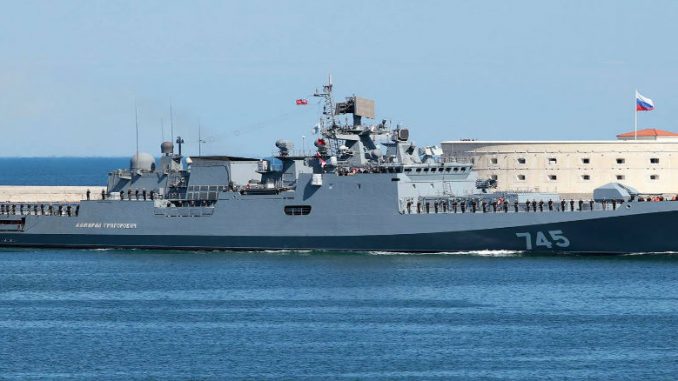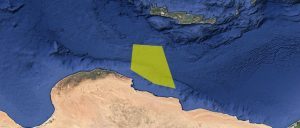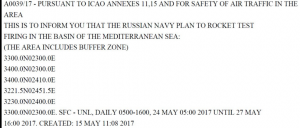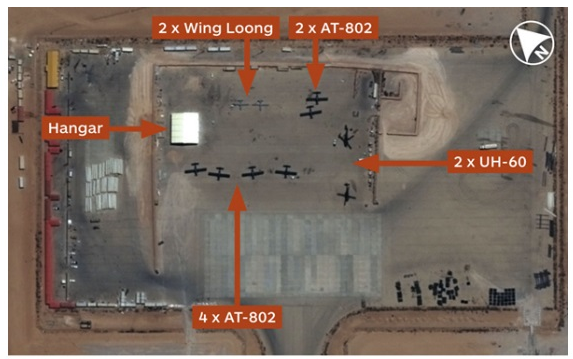
Russia has obviously been interested in Libya, but no one has ever thought that Moscow could intervene in the country’s chaotic civil war by launching cruise missile strikes.
Yesterday, media outlets reported that Russia sets off for rocket fire off Libya’s coast, according to U.S. Federal Aviation Authority (FAA).
Russian warships are planning to carry out live rocket tests in the Mediterranean off the coast of Libya later this month, prompting the U.S. Federal Aviation Authority (FAA) to warn aircraft passing through the airspace of the war-torn north African nation.

The FAA has warned that the tests could be carried out by the Russian navy at any time between May 24-27.
Russia issued a notice to airman (NOTAM) warning of an impending “rocket test” off the eastern coast of Libya next week.
The NOTAM has been issued to include a daily 11-hour window from May 24th through the 27th, when the activity could occur.
The area effected runs off the shore of Libya from roughly the Egyptian border to 150 miles west, and out to see about 100 miles.

In the same context, Michael Kofman, research scientist at CNA Corporation and a fellow at the Kennan Institute, Woodrow Wilson International Center, confirms Russia’s upcoming drill is likely, especially considering their current assembly of forces nearby.
He also said,”It appears to be something beyond a simple artillery test since the NOTAM filed indicates that they will be launching missiles.”
He added,”The Black Sea Fleet recently received a second Admiral Grigorovich-class frigate,and both are currently on duty in the Mediterranean along with AGIs (intelligence ships), and the landing ships making regular supply runs to Syria.”
The ships largely sail in the Eastern Mediterranean near Tartus and the Syrian mainland although some deployments stray further west and Kofman says this is “undoubtedly intentional.”
In fact, these types of notices for “test launches” and “maritime exercises” have often came prior major strikes on Syria by Russia’s various cruise missile launch platforms, included ships, aircraft and submarines.
In past years, similar warning zones have almost always been relegated to the far reaches of the eastern Mediterranean, to the waters off Syria. Even Russia’s exercises in the area have used the body of water between Crete and the Syrian-Lebanon coastline. Also, Russia’s only warm water port is located in Tartus, Syria, adjacent to this naval operating area.
As a result, experts say,”With all this in mind, this latest warning notice is especially peculiar.”
Kofman said,”As we know the last such episode was the Russian carrier Kuznetsov stopping off Libya and hosting Haftar, a strongman that Moscow appears to be supporting in the Libyan internal struggle.”
He added,”More than likely this is not a test, but a political demonstration of support and the prospect of Russia playing a greater role in Libya in the months to come.”
“Sporadic reports have given indications of Moscow exploring whether or not it can become a power broker in Libya,”he said.
In this context, it seems very possible that Russia could be moving to actively support the General Khalifa Haftar’s militia in the region, and specifically in the coastal power center of Benghazi now that he has established a steady foothold there.Once again, this could be done via cruise missile attacks on opposition forces bases or even via naval gunfire support.
At that time, Russia would likely classify such an act as an anti-terror campaign in a similar way as it has done in Syria.
Russia has deployed a number of special operations troops to eastern Egypt, which are likely operating in Libya in support of Haftar, as reported earlier by the Guardian. These troops could work as a targeting cell for such strikes.
In addition, Putin also seemed ready to intensify Moscow’s involvement in the Libya, after meeting with Italian Prime Minister Paolo Gentiloni.
Yesterday, Putin said there is hope for establishing peace in the Libya and Moscow is ready to contribute to the process of settlement in the crisis-torn state.
Meanwhile, General Haftar met with Egypt’s Army Chief of Staff also yesterday, a signal that a possible Egyptian-Russian-FLA alliance could be in the works, according to some media outlets.
Another possibility, albeit a less likely one, is the Russians are demoing weaponry for Egypt, who have ordered a lot of hardware from Moscow since the US turned away from Cairo under the Obama Administration.
In the end, there is no doubt that Russia’s involvement in the Libyan crisis would mark as a major development that would act as another reminder of how Russia is willing to opportunistically fill any geopolitical void left by the U.S.
Although the US has periodically waded back into the Libyan civil war, the actions have largely centered around counter-terror operations,with targeted strikes on particular Islamic extremist groups or individuals operating in the country or even occupying portions of it.
But Russia may be looking to accomplish an entirely different set of objectives. It Moscow could empower Haftar to where his forces can reliably secure the eastern part of Libya, it could offer Russia another warm water port in the Mediterranean and doing so could result in a persistent Russian military presence on NATO’s southern border.



